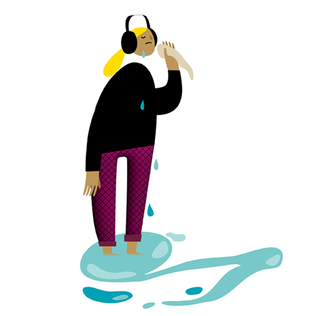
Alex Eben Meyer
A sad song plays. Sadness overtakes the listener. She continues listening, settles into the sadness. She finds, at last, comfort in the sadness. Why?
“A lot of research has assumed—and this seems very reasonable—that the way into this question is to understand why people want to feel sad,” says Joshua Knobe, a professor of philosophy at Yale. “But this isn’t the way we’re thinking of it. It’s true that listening to sad music makes you sad, but that’s not what people value about it.”
In a new paper with three colleagues, Knobe suggests that sad music finds an audience because it creates a sense of connection in the listeners. The process is akin to a heartfelt conversation. If we discuss with friends a longstanding romance that’s on the rocks, we feel connected. “Your friend would likely feel sad about the situation,” Knobe says. “But he wouldn’t only feel sad. He would also feel close to you.”
To test this theory, Knobe, who is an experimental philosopher (exactly what it sounds like), designed two experiments. In the first, participants were asked to describe what technical proficiency and emotionality bring to a piece of music. Technical proficiency, most people agreed, makes for good music. Emotionality, however, represents an essential core of music. Expressiveness is more important to what makes music music than is skill.
The second experiment gave participants descriptions of songs that express one of 72 feelings, from “contempt” to “joy”; they were asked to what degree each song embodies what music is about. Other participants were told about a conversation in which one person expresses some of the 72 feelings; they were asked which conversations would create closeness. On the whole, emotions that generated connection in conversation were also considered quintessential to music.
Knobe and his colleagues are currently studying to what or whom this connection extends: the artist? Our own experience? The world around us? This detail aside, musical connectedness is something we’ve likely all felt. “When you listen to the right song at the right time you don’t feel alone,” Knobe says.
 loading
loading